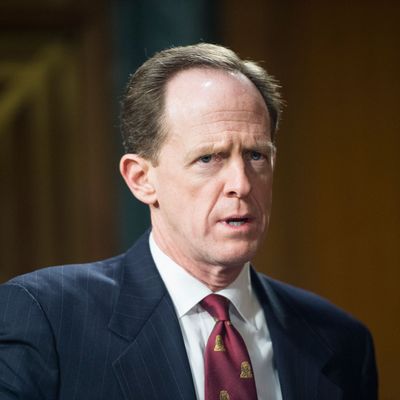
In October 2016, concerned about progressive complacency toward the election just ahead, I tried to draw attention to the dire immediate consequences of a Donald Trump win combined with GOP success in hanging onto control of Congress. I pointed to Paul Ryan’s confident predictions that his own “Better Way” agenda could be smoothly enacted via the un-filibusterable budget-reconciliation process, which he called the “bazooka in my pocket.” On Election Night I warned that big scary changes for the country might be swiftly on the way thanks to the GOP trifecta victory and the Republicans’ power to impose their will no matter what Democrats did to fight or obstruct them.
Turns out I may have spent more time anticipating the actual outcome than did a lot of congressional Republicans, according to one of them, Senator Pat Toomey:
Sen. Patrick J. Toomey offered a simple, remarkable explanation this week for why Republicans have struggled so mightily to find a way to repeal the Affordable Care Act.
“Look, I didn’t expect Donald Trump to win, I think most of my colleagues didn’t, so we didn’t expect to be in this situation,” the Pennsylvania Republican said Wednesday night during a meeting with voters hosted by four ABC affiliates across his state.
According to the Washington Post’s Paul Kane, this is almost certainly why congressional Republicans agreed upon a “repeal and delay” strategy for dealing with Obamacare soon after the election: They had no real clue how to do anything else. But the lack of advance planning has also been evident in the inability of Republicans in the Executive and Legislative branches to reach any kind of agreement on how to proceed with other very basic agenda items — also achievable without Democratic votes — like “tax reform” and the federal budget. And the disarray extends beyond the legislative process:
Perhaps nowhere did the surprise factor of Trump’s victory show its impact more than in the effort to fill top jobs inside the administration. Clinton’s campaign, fully expecting victory, was stocked with hundreds of volunteer advisers who were already angling for sub-Cabinet-level posts in key agencies including the departments of State, Justice and Defense. Many of them were current or former senior staff to congressional Democrats.
But with Republicans, those connections were rare because few believed them to be worth the effort.
It is hard to overstate the difference for Republicans between the “Trump wins” and “Clinton wins” scenarios. After all, the GOP had been rehearsing the politics of obstruction and enjoying the innocent pleasures of passing consequences-free legislation for six long years after Republicans retook the House in 2010 (and then the Senate in 2014). The transition from gesturing to governing was especially tough for the anti-government party, and it did not help that the new GOP president was so unorthodox, unpredictable, and inexperienced a figure. Republicans did not, as Toomey said, “expect to be in this situation,” so they did not go through the difficult process of airing their differences and putting together pre-vetted consensus plans. On issue after issue, they are doing that now, on the fly, using — as Toomey puts it— “live ammo.”
It’s not going very well.






























